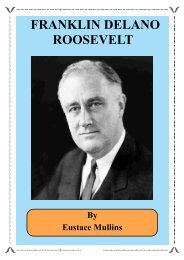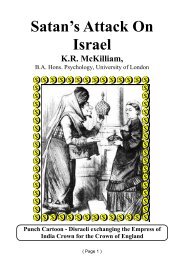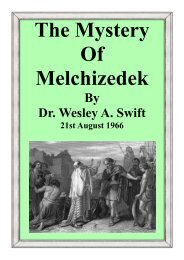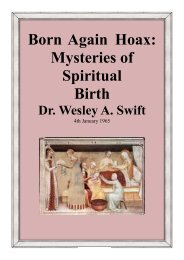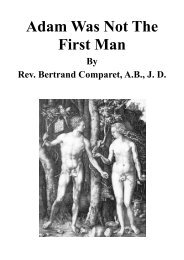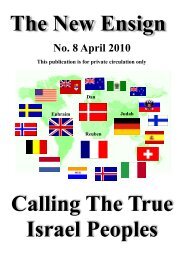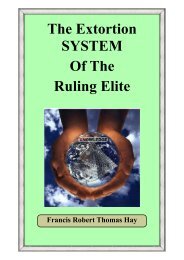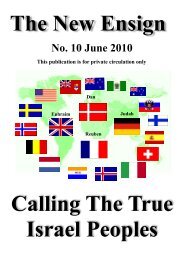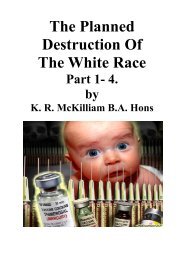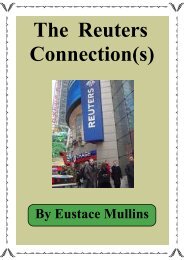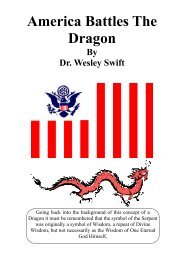Curse of Cannan - The New Ensign
Curse of Cannan - The New Ensign
Curse of Cannan - The New Ensign
Create successful ePaper yourself
Turn your PDF publications into a flip-book with our unique Google optimized e-Paper software.
takes care <strong>of</strong> its own. Princess Paley, wife <strong>of</strong> the Grand Duke Paul, stated that the English<br />
Ambassador at St. Petersburg, Sir George Buchanan, fomented and directed the Russian<br />
Revolution on direct instructions from Lloyd George, head <strong>of</strong> the Liberal Party in England.<br />
<strong>The</strong> Bolsheviks were provided with ample funds for their takeover <strong>of</strong> Russia. On September<br />
21,1917, Trotsky received a telegram from Stockholm: "<strong>The</strong> management <strong>of</strong> the Bank <strong>of</strong> Max<br />
Warburg & Co. informed him that a current account had been opened for him at Stockholm for<br />
the purposes <strong>of</strong> his undertaking." Trotsky had previously been presented with $10,000 in cash<br />
by the Rockefellers when he sailed from <strong>New</strong> York; other funds were forwarded to him from<br />
Berlin through the Disconto Gesellschaft, the Nya Bank, and the Siberian Bank, among other<br />
intermediaries, such as HelphandParvus, Ganetsky, Koslousky, and Krassin. After the<br />
Revolution, Krassin went back to work for Siemens, the giant German electric company; as<br />
Russian representative, he was supported by Hugo Stinnes, Felix Deutsch, manager <strong>of</strong> A.E.G.,<br />
and by Walter Rathenau.<br />
Although all <strong>of</strong> the Czar's enormous deposits in foreign banks was retained by those banks<br />
without payment to any member <strong>of</strong> his family, a small portion <strong>of</strong> his Russian holdings were set<br />
aside by the new Bolshevik government as a secret fund which was exercise final control in the<br />
Soviet Government during the ensuing decades. This trust was composed <strong>of</strong> Dzerzhinsky, founder<br />
<strong>of</strong> the Cheka, the British secret agent Sidney Reilly, and W. Averell Harriman. <strong>The</strong> trust was a<br />
continuation <strong>of</strong> the Parvus fund which had brought Lenin to power, an operation which had been<br />
directed by the influential behind-the-scenes figure, the Venetian Count Volpi diMisurata, a<br />
bJack nobility figure who had put Mussolini in power, orchestrated the numerous Balkan Wars,<br />
and secretly directed the Russian Revolution.<br />
Oddly enough, the Bolshevik Revolution was greeted with enthusiastic approval <strong>of</strong> many <strong>of</strong> the<br />
world's leading financiers. One <strong>of</strong> the most prominent <strong>of</strong> their number, Jacob Schiff, senior<br />
partner <strong>of</strong> Kuhn, Loeb Co., <strong>New</strong> York, telegraphed his greetings, as recounted in the <strong>New</strong> York<br />
Times, March 19, 1917: "A persistent foe <strong>of</strong> the tyrannical autocracy, the merciless persecutors<br />
<strong>of</strong> my co-religionists, may I congratulate through you the Russian people upon what they have<br />
now so wonderfully achieved and wish you and your colleagues in the new government every<br />
success." <strong>The</strong> Minister, Miliouk<strong>of</strong>f, a longtime friend <strong>of</strong> Schiff, replied, "We are united in hatred<br />
and antipathy to ancient regimes now overthrown." Here again is a direct quote from the Will<br />
<strong>of</strong> Canaan "hate your masters."<br />
One <strong>of</strong> the most misunderstood events in history is the Allied "invasion" <strong>of</strong> Russia after the<br />
Bolshevik Revolution. This "invasion" again was featured recently in the Soviet Press as urgent<br />
reason not to "trust" the United States. In fact, the Allied troops were sent to Russia to divert the<br />
successful Counter Revolution <strong>of</strong> the White forces, and at the same time, to give the Red Army<br />
propagandists, principally Trotsky, a rallying cry to the faltering Red campaign, that "Mother<br />
Russia" was being invaded by "foreign troops." This proved to be an irresistible call to the Russian<br />
peasants, who immediately rallied behind the Red Army and gave them total victory. In fact,<br />
several divisions, mostly British and American, were sent to Siberia, where they remained for a<br />
year and a half, without participating in any action. None <strong>of</strong> the troops had any idea <strong>of</strong> what they<br />
were doing there; they returned home as mystified as when they had departed. Had they been<br />
assigned to "invade" Russia, <strong>of</strong> course, they would have landed on the European coast and<br />
marched straight toward Moscow, which could have been easily taken by these well-armed and<br />
trained divisions. <strong>The</strong>y had actually been sent to Siberia to betray the White Russians. This<br />
maneuver was exposed in the <strong>New</strong> York Times, February 15, 1920, "when Vladivostok was<br />
liberated from the Kolchak faction." "<strong>The</strong>re is a pronounced pro-American feeling evident.<br />
Revolutionary leaders mounted the steps <strong>of</strong> buildings across the street, making speeches calling<br />
the Americans real friends, who, at a critical time, saved the present movement."<br />
<strong>The</strong> "mystery" <strong>of</strong> the American military presence in Russia was never a mystery to its secret<br />
Masonic Canaanite backers. <strong>The</strong> three directors <strong>of</strong> the Federal Reserve Bank <strong>of</strong> <strong>New</strong> York who<br />
( Page 106)



